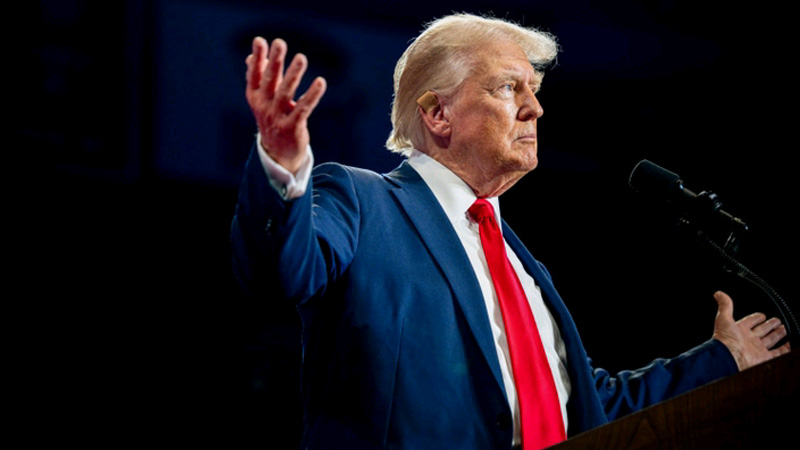Attempt to stop people with felony convictions from voting Takes A New Turn As Trump Stuns America

Photo: Brandon Bell/Getty Images
In 2018, Florida voters overwhelmingly supported a constitutional amendment to restore the voting rights of individuals with felony convictions after they have completed their sentences, excluding those convicted of murder or felony sex crimes.
The amendment was seen as a significant victory for voting rights advocates, offering millions of Floridians the opportunity to regain their right to vote.
However, the implementation of this amendment has been met with challenges, particularly as Florida Republicans have sought to impose barriers that complicate the process for former felons seeking to exercise their voting rights.
According to a post made by HuffPost on their verified X account, formerly known as Twitter, on Tuesday August 27, 2024, reported that former President Donald Trump cast his vote in the Florida primary elections on August 14, 2024.
This event, which occurred only months after Trump was convicted of 34 felonies in New York, sparked widespread debate and drew attention to the complexities surrounding voting rights for people with felony convictions.
Trump’s decision to vote in Florida’s primary election has become a focal point in this ongoing discussion.
As one of the most prominent figures in the Republican Party and a convicted felon, Trump’s actions have brought attention to the inconsistencies and difficulties that exist within the current system.
For many, his ability to vote despite his recent felony convictions is a stark reminder of the inequities that still plague the process.
Neil Volz, deputy director of the Florida Rights Restoration Coalition (FRRC), a group dedicated to promoting voting rights for formerly incarcerated people, spoke about the significance of Trump’s vote.
“Trump is an example of some of the challenges that exist, but also the opportunities that exist to create a better system – a process that works better for everybody,” Volz stated. His comments reflect the broader struggle to ensure that all eligible voters, regardless of their past, have access to the ballot box.
The FRRC has been at the forefront of efforts to advocate for the rights of former felons in Florida. Since the passage of the 2018 amendment, the organization has worked tirelessly to help individuals navigate the often-confusing requirements needed to restore their voting rights.
This includes helping them understand and fulfill financial obligations, such as fines and fees, that may be required before their rights can be reinstated.
However, the state government’s approach has been less accommodating. Despite the amendment’s clear intention, Florida lawmakers have introduced measures that create additional hurdles for former felons.
For example, legislation passed in 2019 requires that all financial obligations, including court fees and restitution, must be paid before voting rights are restored.
Critics argue that this effectively amounts to a “poll tax,” disproportionately affecting low-income individuals and making it difficult for many former felons to regain their right to vote.
Trump’s vote has highlighted these issues, raising questions about how the system applies to high-profile individuals compared to ordinary citizens.
While Trump was able to cast his ballot without apparent difficulty, many others in similar situations have faced significant challenges. This discrepancy has led to calls for further reforms to ensure that the right to vote is truly accessible to all who qualify.
The debate over voting rights for former felons is not limited to Florida. Across the United States, various states have differing policies regarding the restoration of voting rights.
Some states, like Maine and Vermont, never revoke voting rights for felons, even allowing them to vote while incarcerated. Others, like Kentucky and Iowa, have historically imposed lifetime bans, though recent changes have eased these restrictions.
In Florida, the issue has become particularly contentious due to the state’s large population of former felons and its critical role in national elections. The state’s electoral significance means that even small changes in voter turnout can have a significant impact on election outcomes.
As a result, the restoration of voting rights has taken on added importance, both for those directly affected and for the broader political landscape.
Voting rights advocates argue that the ability to vote is a fundamental aspect of reintegration into society for those who have served their sentences.
Denying this right, they contend, perpetuates a cycle of disenfranchisement and exclusion, making it harder for individuals to fully participate in their communities.
Moreover, they emphasize that the restoration of voting rights is not only a matter of fairness but also a crucial step in reducing recidivism and promoting public safety.
For Trump, his decision to vote in the Florida primary was likely motivated by political considerations rather than a desire to highlight voting rights issues.
However, the event has inadvertently shone a spotlight on the ongoing struggles faced by many former felons in Florida and across the country.
The contrast between Trump’s ability to vote and the obstacles faced by others serves as a powerful reminder of the work that remains to be done to ensure that the right to vote is truly universal.
As the 2024 election cycle continues, the issue of voting rights for former felons is likely to remain a prominent topic of discussion.
Advocates like Volz and organizations like the FRRC will continue to push for reforms that make it easier for individuals to regain their rights and participate in the democratic process.
Meanwhile, Trump’s vote will stand as a symbol of the complexities and contradictions inherent in the current system, highlighting both the progress that has been made and the challenges that still lie ahead.
Trump’s participation in Florida’s primary election, despite his felony convictions, underscores the ongoing debate over voting rights for former felons. While Florida’s 2018 amendment represented a significant step forward, the barriers that have been erected since then continue to hinder many from exercising their rights.
Trump’s vote serves as a reminder of the importance of creating a system that is fair, accessible, and truly reflective of the democratic ideals it is meant to uphold.





